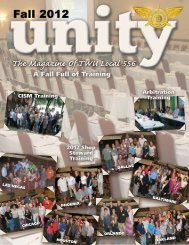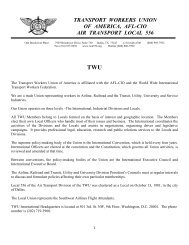April Unity - TWU 556
April Unity - TWU 556
April Unity - TWU 556
You also want an ePaper? Increase the reach of your titles
YUMPU automatically turns print PDFs into web optimized ePapers that Google loves.
To Your Health“Spring” into healthby Gayle Ross, Treasurer and Health CoordinatorIjust returned from a Health & Safety Symposium inLos Angeles where I learned many exciting thingsfor the Flight Attendant industry. I will be sharingmany of those ideas with you in my next few articles.Every topic we discussed came back to howto keep Flight Attendants healthy while working inairplanes, airports, and staying in hotels filled withsick people and germs. The overwhelming responsewas, “wash your hands!” it seems so basic, yet canmake such a huge difference. How many timesafter washing your hands have you turned off thefaucet, pressed the lever for a paper towel, oropened the door to exit the restroom? Germs!! Pressthe lever for the paper towels first, then wash yourhands, grab the paper towels, and use the papertowel to turn off the faucet and open the door. Trykeeping hand sanitizer with you in the galley and byall means use the gloves when picking up trash.Many of you have called me and asked me topublish my article about vaccinations again, sosince we are “springing in to health”, your wish is mycommand…. wash you hands, stay healthy, andread on!The following are diseases which catch yourattention and may change your life. They are all lifethreatening, but most have a vaccine which couldprevent the disease from ruining your life. The followingis some information based on research Ihave done. Please consult your doctor for moreinformation and to discuss these diseases and therisks/rewards of any medication or vaccination.Hepatitis is the inflammation of the liver causedby one of five currently identified Hepatitis viruses.All of these viruses can cause an acute disease withsymptoms lasting several weeks including yellowingof the skin and eyes (jaundice), dark urine, extremefatigue, nausea, vomiting and abdominal pain.Hepatitis A virus is spread from person to personby putting something in the mouth that has beencontaminated with the stool of a person with hepatitisA. Transmission can occur through exposure tocontaminated water, ice, or shellfish harvestedfrom sewage-contained water; or fruits, vegetables,or other foods that are eaten uncooked andthat were contaminated during harvesting or subsequenthandling. Hepatitis A is the most commonvaccine-preventable infection acquired duringtravel. Anyone who travels should consider receivingthis vaccination. The safety of Hepatitis A vaccinefor pregnant women has not been determined.Hepatitis B (HBV) is transmitted by direct contactwith the blood or bodily fluids of an infectedperson; it is not spread through food or water or bycasual contact. A person can get infected in severalways, such as: having unprotected sex with aninfected person, sharing needles, being stuck with aused needle on the job, or during birth when thevirus passes from an infected mother to her baby.People should not receive the Hepatitis B vaccine ifthey have ever had a life-threatening allergic reactionto baker’s yeast or to a previous dose ofHepatitis B vaccine.Hepatitis C is transmitted like Hepatitis B andcan lead to cirrhosis, liver cancer or liver failure.Hepatitis C is a common co-infection among HIVpositivepeople. While there are vaccines that canprevent Hepatitis A and B infections, there is no vaccinefor Hepatitis C. Even without treatment, risk ofprogression can be minimized through: abstinencefrom alcohol and other drugs and vaccinations withthe Hepatitis A vaccine and Hepatitis B vaccine.Hepatitis D & E are very rare and there is novaccine. Hepatitis D is dependent on HBV for replication.Hepatitis E is transmitted primarily by thefecal-oral route. Virtually all cases in developedcountries have been reported among travelersreturning from high HEV effected areas.Meningococcal Meningitis is caused by bacteriawhich invade the lining surrounding the brain,(the meninges). It is called MeningococcalSepticemia or Meningococcemia when it entersthe blood stream, destroying organs and tissue in amatter of hours. Meningococcal disease, althoughrare, is devastating because early symptoms resemblethe flu, making it difficult to recognize.Adolescents and young adults are at an increasedrisk of contracting meningococcal disease due to(Continued on page 35)28















